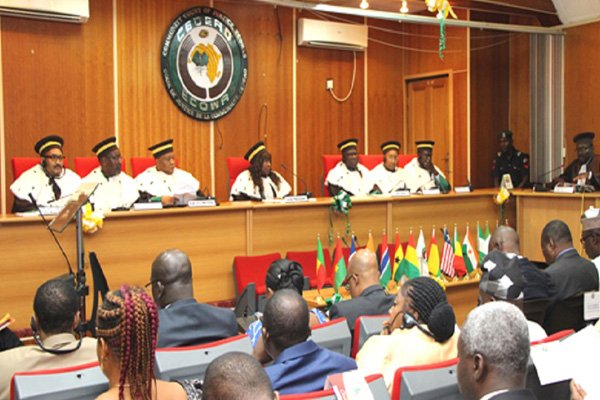The President of the ECOWAS Court of Justice, Justice Ricardo Gonçalves, has said the regional court is implementing reforms aimed at streamlining its judicial procedures to ensure faster and more efficient justice delivery across West Africa.
Gonçalves made this known on Monday in Niger State during the opening of the 2025 Judicial Retreat of the Community Court, themed “Efficiency and Effectiveness: Streamlining Processes for a Dynamic ECOWAS Court.”
According to him, the retreat provides an opportunity for the Court to review its operations, assess inter-departmental collaboration, and evaluate the implementation of previous resolutions in order to enhance institutional performance.
“We are taking deliberate steps to reform and streamline our judicial procedures so that justice within the ECOWAS Community is delivered more swiftly, efficiently, and in accordance with the law,” Gonçalves said.
“Our procedures must remain faithful to the law while being responsive to the realities of justice delivery in our time.”
The ECOWAS Court President noted that this year’s deliberations would pay particular attention to comparative judicial practices relating to summary hearings, interim measures, and other key procedural matters necessary for ensuring timely and fair adjudication.
He stressed that litigants across the subregion expect efficiency, transparency, and timeliness in the Court’s rulings, adding that the judiciary must evolve to meet the demands of regional integration and citizens’ rights.
Read Also:
Tinubu urges ECOWAS leaders to embrace Ghana’s democratic example
WAANSA Nigeria lauds ECOWAS, NCCSALW initiative on small arms
ECOWAS Speaker tasks Muslims to extend love, care to downtrodden
Gonçalves further disclosed that the retreat would also review the Court’s annual performance report to identify challenges, measure progress, and set actionable priorities for the next judicial year.
He emphasized that the credibility of the Court depends on discipline, collaboration, and respect for institutional roles among judges and staff, describing these as essential elements for fulfilling its mandate.
“From this retreat, we must emerge with clear resolutions that will guide our work in the coming year, strengthening collaboration, institutionalising accountability, and improving our judicial procedures to make them more transparent and accessible to litigants,” he added.
ECOWAS Court has over the years faced structural and operational challenges, including case backlogs, limited funding, and low compliance with its rulings by some member states, issues that have occasionally slowed the Court’s effectiveness in enforcing regional justice.
In his remarks, the Chief Registrar of the Court, Dr. Yaouza Ouro-Sama, revealed that human rights-related matters now constitute more than 90 per cent of the cases filed before the Court.
He noted that the ECOWAS Court has earned international recognition for its firm stance on human rights protection, a development that has made it one of the most active and respected regional judicial institutions in Africa.
“The Court’s human rights mandate has become the hallmark of its judicial activities, with human rights cases constituting over 90 per cent of the matters filed,” Ouro-Sama said.
“This elevated profile both within the subregion and globally has drawn increasing interest from legal practitioners, scholars, and stakeholders.”
He attributed the Court’s growing influence to the dedication and intellectual rigour of its judges, whose judgments have received widespread international acclaim.
Ouro-Sama added that the annual judicial retreat serves as an avenue for introspection and institutional renewal, enabling the Court’s leadership to devise new strategies to boost efficiency, accountability, and access to justice for citizens of the ECOWAS subregion.






